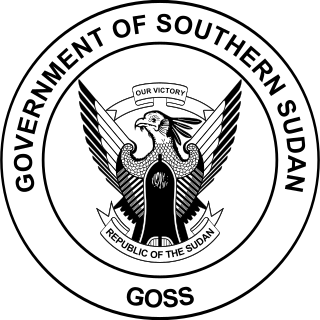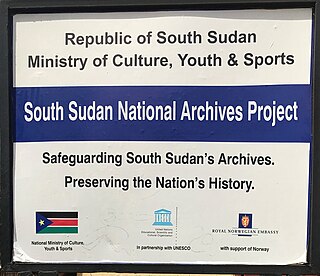
The United Nations Interim Administration Mission in Kosovo (UNMIK) is the officially mandated mission of the United Nations in Kosovo. The UNMIK describes its mandate as being to "help the United Nations Security Council achieve an overall objective, namely, to ensure conditions for a peaceful and normal life for all inhabitants of Kosovo and advance regional stability in the Western Balkans."

South West Africa was a territory under South African administration from 1915 to 1990, after which it became modern-day Namibia. It bordered Angola, Botswana, South Africa, and Zambia. During its administration, South Africa applied its own apartheid system in the territory of South West Africa.
A provisional government, also called an interim government, an emergency government, a transitional government or provisional leadership, is a temporary government formed to manage a period of transition, often following state collapse. Provisional governments are generally appointed, and frequently arise, either during or after civil or foreign wars, or during difficult times such as during invasion, economic crisis, or widespread infiltration of saboteurs and counter-revolutionaries such as during the French Revolution.

The Constituent Assembly of India was elected to frame the Constitution of India. It was elected by the 'Provincial Assembly'. Following India's independence from the British rule in 1947, its members served as the nation's first Parliament as the 'Provisional Parliament of India'.

The politics of South Sudan concern the system of government in the Republic of South Sudan, a country in East Africa, and the people, organizations, and events involved in it.
The political status of Kosovo, also known as the Kosovo question, is the subject of a long-running political and territorial dispute between the Serbian government and the Government of Kosovo, stemming from the breakup of Yugoslavia (1991–92) and the ensuing Kosovo War (1998–99). In 1999, the administration of the Autonomous Province of Kosovo and Metohija was handed on an interim basis to the United Nations under the terms of UNSCR 1244 which ended the Kosovo conflict of that year. That resolution reaffirmed the territorial integrity of Serbia over Kosovo but required the UN administration to promote the establishment of 'substantial autonomy and self-government' for Kosovo pending a 'final settlement' for negotiation between the parties.

The Constitution of Kosovo is the supreme law of the Republic of Kosovo, a territory of unresolved political status. Article four of the constitution establishes the rules and separate powers of the three branches of the government. The unicameral Assembly of the Republic exercises the legislative power, the executive branch led by the President and the Prime Minister which are responsible for implementing laws and the judicial system headed by the Supreme Court.

The Declaration "On the Restoration of Independence of the Republic of Latvia" was adopted on 4 May 1990 by the Supreme Soviet of the Latvian SSR in which Latvia declared independence from the Soviet Union. The Declaration stated that, although Latvia had de facto lost its independence in 1940, when it was annexed by the Soviet Union, the country had de jure remained a sovereign country as the annexation had been unconstitutional and against the will of the Latvian people.

The vice president of Sudan is the second highest political position obtainable in Sudan. Currently there is a provision for one de facto vice president, deputy chairman of the Transitional Sovereignty Council, who is appointed by the chairman of the council. Historically either the first or the second vice president was from Southern Sudan. From 2011 until the abolition of the post in 2019, the second vice president was from Darfur.

The Southern Sudan Legislative Assembly was established in 2005 by the Interim constitution of the Southern Sudan 2005. Pending elections in 2010, all 170 members were appointed according to the following formula as per the Comprehensive Peace Agreement (CPA): 70% of seats to SPLM, 15% to NCP, and 15% to other parties. The Assembly met in Juba, The capital of Southern Sudan and Central Equatoria State.

The temporary de factoConstitution of Sudan is the Draft Constitutional Declaration, which was signed by representatives of the Transitional Military Council and the Forces of Freedom and Change alliance on 4 August 2019. This replaced the Interim National Constitution of the Republic of Sudan, 2005 (INC) adopted on 6 July 2005, which had been suspended on 11 April 2019 by Lt. Gen Ahmed Awad Ibn Auf in the 2019 Sudanese coup d'état.

South Sudan, officially the Republic of South Sudan, is a landlocked country in eastern Central Africa. It is bordered by Ethiopia, Sudan, the Central African Republic, the Democratic Republic of the Congo, Uganda, and Kenya. Its population was estimated at 11,088,796 in 2023. Juba is the capital and largest city.

The Constitution of Southern Sudan was the 2005 Interim Constitution of Southern Sudan, as established by the Government of Sudan and the Sudan People's Liberation Army/Movement within the framework of the Comprehensive Peace Agreement ending the Second Sudanese Civil War, signed into practice on 9 January 2005.

South Sudan is a multilingual country, with over 60 indigenous languages spoken. The official language of the country is English which was introduced in the region during the colonial era.

Kosovo has a civil law system which is also sometimes known as the Continental European law system. The central source of law that is recognized as authoritative is codifications in a constitution or statute passed by legislature, to amend a code. This system of Kosovo has experienced several changes throughout the years and is currently a system that includes prominent bodies and branches that help Kosovo enact adequate laws and conduct proper legal procedures.

General elections were scheduled to be held in South Sudan by 9 July 2015, the first since independence. However, in light of an alleged coup d'état attempt and continuing conflict in the country this has been thrown into doubt, especially since no permanent constitution has been formulated. The South Sudan parliament voted in April 2015 to amend the country's transitional 2011 constitution to extend the presidential and parliamentary term until 9 July 2018, with 264 members in favour and a handful opposing it. It was postponed again to 2021 in July 2018. Following the peace agreement that ended the civil war, a transitional period of three years was agreed on, which would be followed by elections in 2023. In 2022, the transitional government and opposition agreed to move it to late 2024.

The International Development Law Organization (IDLO) is an intergovernmental organization dedicated to the promotion of the rule of law.

South Sudanese nationality law is regulated by the Constitution of South Sudan, as amended; the South Sudanese Nationality Act and Nationality Regulations, and their revisions; and various international agreements to which the country is a signatory. These laws determine who is, or is eligible to be, a national of South Sudan. The legal means to acquire nationality, formal legal membership in a nation, differ from the domestic relationship of rights and obligations between a national and the nation, known as citizenship. Nationality describes the relationship of an individual to the state under international law, whereas citizenship is the domestic relationship of an individual within the nation. In South Sudan, nationality is often equated with ethnicity, despite recognition of the legal definitions. South Sudanese nationality is typically obtained under the principle of jus soli, i.e. by birth in South Sudan, or jus sanguinis, born to parents with South Sudanese ancestry. It can be granted to persons with an affiliation to the country, or to a permanent resident who has lived in the country for a given period of time through naturalization.

A series of political agreements among Sudanese political and military forces for a democratic transition in Sudan began in July 2019. Omar al-Bashir overthrew the democratically elected government of Sadiq al-Mahdi in 1989 and was himself overthrown in the 2019 Sudanese coup d'état, in which he was replaced by the Transitional Military Council (TMC) after months of sustained street protests. Following further protests and the 3 June Khartoum massacre, TMC and the Forces of Freedom and Change (FFC) alliance agreed on 5 July 2019 to a 39-month transition process to return to democracy, including the creation of executive, legislative and judicial institutions and procedures.













